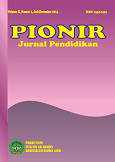HUBUNGAN MINAT BELAJAR DAN MOTIVASI BELAJAR DENGAN HASIL BELAJAR MATEMATIKA PADA SISWA KELAS V DI MIS NURUL HIKMAH UJUNG PADANG
DOI:
https://doi.org/10.22373/pjp.v11i1.13108Keywords:
Learning Interest, Learning Motivation, Mathematics Learning Outcomes.Abstract
The background of the problem based on an initial study conducted by a fifth grade mathematics teacher at MIS Nurul Hikmah Ujung Padang said that the students' mathematics learning outcomes were quite good as seen from the student learning outcomes listed in the students' final reports. From the perspective of learning theory that affects learning outcomes including interest and motivation, in this case there are still students who are lazy in doing homework (PR). Quantitative research is research using a quantitative research design aimed at capturing quantitative data in the form of numerical data using a validated instrument that reflects the dimensions and indicators of the variable and is distributed to a particular population or sample. Based on the method, this study uses the correlational method, which is a study to determine the relationship and level of relationship between two or more variables without any attempt to influence these variables so that there is no variable manipulation. This approach is used to describe the relationship between interest in learning mathematics and motivation to learn mathematics with students' mathematics learning outcomes in class V MIS Nurul Hikmah Ujung Padang. Based on the results of research in this journal, the following conclusions can be drawn: There is a relationship between interest in learning and learning outcomes in mathematics. This can be seen based on data analysis using product moment correlation, obtained a price of 0.436> 0.329. With a significance value of 0.000 <0.05, it means that there is a significant relationship between learning interest and mathematics learning outcomes for fifth grade students at MIS Nurul Hikmah Ujung Padang. There is a relationship between learning motivation and mathematics learning outcomes. This can be seen based on the calculations performed using the product moment, namely (0.486> 0.329). With a significance value of 0.008 < 0.005, it means that there is a significant relationship between learning motivation and mathematics learning outcomes for fifth grade students at MIS Nurul Hikmah Ujung Padang. There is a significant relationship between interest in learning and learning motivation with learning outcomes in mathematics.
References
B. Hurlock, Elisabeth, Perkembangan Anak Jilid II, Jakarta: Erlangga, 1997.
B. Uno, Hamzah, Teori Motivasi Dan Pengukurannya Analisis Di Bidang Pendidikan, Jakarta: Bumi Aksara, 2015.
Darmadi, Hamid Metode Penelitian Pendidikan, Bandung: Alfabeta, 2011.
Djamara, Saiful Bahri, Psikologi Pendidikan, Jakarta: Bumi Akasara, 2002.
H, Djaali, Psikologi Pendidikan, Jakarta: PT. Bumi Aksara, 2009.
Khairani, Makmun, Psikologi Pendidika, Yogyakarta: Aswaja Pressindo, 2019.
M. Dalyono, Psikologi Pendidikan, Jakarta: Rineka Cipta, 1997.
Margono, Metodologi Penelitian Pendidikan, Jakarta, PT. Rineka Cipta, 2000.
Noor, Juliansyah, Metodologi Penelitian: Skripsi, Tesis, Disertasi, Dan Karya Ilmiah, Jakarta: Kencana Prenadamedia Grup, 2011.
Puji Astuti, Siwi, “Pengaruh Kemampuan Awal dan Minat Belajar Terhadap Prestasi Belajar Fisika” dalam Jurnal Formatif UNINDRA, Volume 5, No. 1, 2015.
Purwanto, M. Ngalim, Psikologi Pendidikan, Bandung: Remaja Rosdakarya, 1990
Rahman Shaleh, Abdul, Psikologi Suatu Pengantar Dalam Perspektif Islam, Jakarta: Kencana Prenada Media Group, 2009.
Sudjana, Nana, Penilaian Proses Hasil Belajar Mengajar, Bandung: PT. Remaja Rosdakarya, 2001.
Sudjanto, Agus, Psikologi Umum Jakarta: Bumi Aksara, 1995.
Sugihartono, dkk, Psikologi Pendidikan, Yogyakarta: UNYPress, 2007.
Sukardi, Medotologi Penelitian Pendidikan: Kompetensi dan Praktiknya, Jakarta: Bumi Aksara, 2003.
Surakhmad, Wirarno, Pengantar Interaksi Belajar Mengajar, Bandung: Tarsito, 1990.
Suryosubroto, Beberapa Aspek Dasar-Dasar Kependidikan, Jakarta: Rineka Cipta, 2010.
Susanto, Ahmad, Teori Belajar Dan Pembelajaran Di Sekolah Dasar, Bandung: Prenadamedia Group, 2013.
Syah, Muhibbin, Psikologi Belajar, Jakarta: PT. Rajagrafindo Persada, 2009.
Downloads
Published
Issue
Section
License
- Authors retain copyright and grant the journal right of first publication with the work simultaneously licensed under a Creative Commons Attribution License that allows others to share the work with an acknowledgment of the work's authorship and initial publication in this journal.
- Authors are able to enter into separate, additional contractual arrangements for the non-exclusive distribution of the journal's published version of the work (e.g., post it to an institutional repository or publish it in a book), with an acknowledgment of its initial publication in this journal.
- Authors are permitted and encouraged to post their work online (e.g., in institutional repositories or on their website) prior to and during the submission process, as it can lead to productive exchanges, as well as earlier and greater citation of published work (See The Effect of Open Access).

